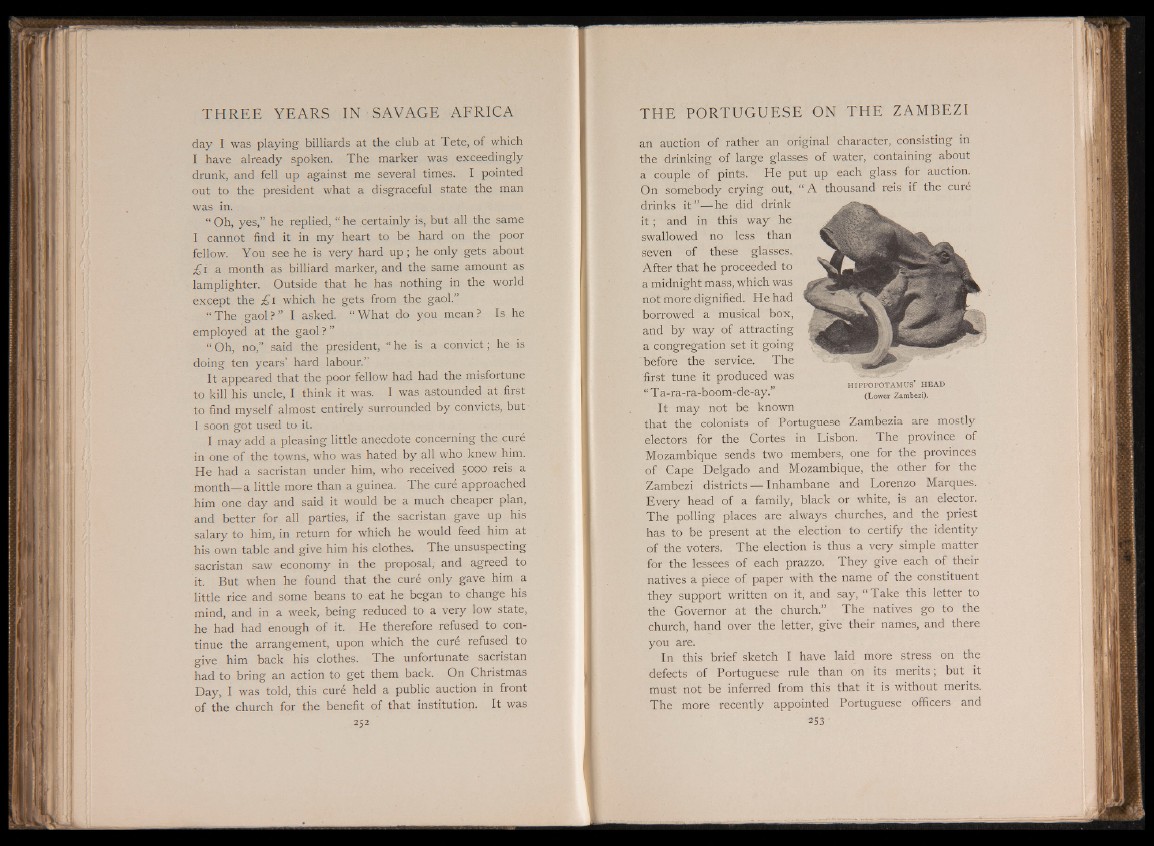
day I was playing billiards at the club at Tete, of which
I have already spoken. The marker was exceedingly
drunk, and fell up against me several times. I pointed
out to the president what a disgraceful state the man
was in.
“ Oh, yes,” he replied, “ he certainly is, but all the same
I cannot find it in my heart to be hard on the poor
fellow. You see he is very hard up; he only gets about
Z i a month as billiard marker, and the same amount as
lamplighter. Outside that he has nothing in the world
except the £ i which he gets from the gaol.”
“ The gaol?” I asked. “ What do you mean? Is he
employed at the gaol ? ”
“ Oh, no,” said the president, “ he is a convict; he is
doing ten years’ hard labour.”
It appeared that the poor fellow had had the misfortune
to kill his uncle, I think it was. I was astounded at first
to find myself almost entirely surrounded by convicts, but
I soon got used to it.
I may add a pleasing little anecdote concerning the curé
in one of the towns, who was hated by all who knew him.
He had a sacristan under him, who received 5000 reis a
month—a little more than a guinea. The curé approached
him one day and said it would be a much cheaper plan,
and better for all parties, if the sacristan gave up his
salary to him, in return for which he would feed him at
his own table and give him his clothes. The unsuspecting
sacristan saw economy in the proposal; and agreed to
it. But when he found that the curé only gave him a
little rice and some beans to eat he began to change his
mind, and in a week, being reduced to a very low state,
he had had enough of it. He therefore refused to continue
the arrangement, upon which the curé refused to
give him back his clothes. The unfortunate sacristan
had to bring an action to get them back. On Christmas
Day, I was told, this curé held a public auction in front
of the church for the benefit of that institution. It was
252
an auction of rather an original character, consisting in
the drinking of large glasses of water, containing about
a couple of pints. He put up each glass for auction.
On somebody crying out,
“ A thousand reis if the curé
drinks it ”—he did drink
i t ; and in this way he
swallowed no less than
seven of these glasses.
After that he proceeded to
a midnight mass, which was
not more dignified. He had
borrowed a musical box,
and by way of attracting
a congregation set it going
before the service. The
first tune it produced was
“ T a-ra-ra-boom-de-ay.”
It may not be known
that the colonists of Portuguese Zambezia are mostly
electors for the Cortes in Lisbon. The province of
Mozambique sends two members, one for the provinces
of Cape Delgado and Mozambique, the other for the
Zambezi districts 1 - Inhambane and Lorenzo Marques.
Every head of a family, black or white, is an elector.
The polling places are always churches, and the priest
has to be present at the election to certify the identity
of the voters. The election is thus a very simple matter
for the lessees of each prazzo. They give each of their
natives a piece of paper with the name of the constituent
they support written on it, and say, “ Take this letter to
the Governor at the church.” The natives go to the
church, hand over the letter, give their names, and there
you are.
In this brief sketch I have laid more stress on the
defects of Portuguese rule than on its merits; but it
must not be inferred from this that it is without merits.
The more recently appointed Portuguese officers and
253
HIPPOPOTAMUS HEAD
(Lower Zambezi).